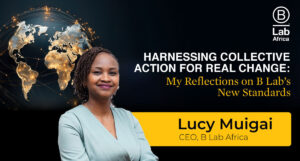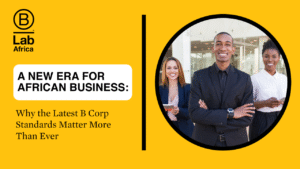An interview with Philli Smit, Impact Manager at Zoona, which is a Certified B Corp in Zambia. She speaks to us about how they are utilizing financial inclusion to create sustainable change in Africa.
Let’s start with the basics: What do the Sustainable Development Goals (SDGs) mean for Zoona? And why do they matter?
Philli: We are aware that there are multiple global development issues, with financial inclusion being a key issue in our area of expertise. Without the proper implementation of leadership and values within organisations, solving these challenges is nearly impossible. We believe that through internal and external alignment with the SDGs, companies and communities can work together to help alleviate some of these challenges.
The Sustainable Development Goals provide a powerful aspiration for improving our world. Why do you think it’s imperative for businesses in South Africa to engage with the SDGs?
Philli: Without leadership from key business partners and allies, solving these challenges is an almost unattainable goal. Local actors can each play their part in understanding what goals they want to achieve, and can help to work together to guide and uplift others into what will be globally beneficial. An important aspect of the SDGs is the focus on innovative ways of solving these challenges. As a Fintech focused on solving collections and distributions issues in Africa, this aligns well with our core ethos as a company.
How does Zoona identify opportunities through the SDGs to deliver sustainable change? Are there any opportunities you are already working towards?
Philli: For us, we really focus on Financial Inclusion as our primary outcome, and then also what might be secondary impacts to the businesses and companies that we support. By understanding how our products are used, and the impact that we have for these clients, we are able to identify these opportunities and build on them.
In your opinion, how can businesses in Africa play an active role in identifying and financing opportunities to deliver the Global Goals in the Decade of Action?
Philli: Africa is a unique continent made up of totally independent and different countries. A good starting point for businesses to play an active role, especially those companies who operate in multiple markets, is to understand this uniqueness and ensure that products or solutions are suited to each market and the challenges they face. For a business to have sustainable impact, it must have its own clearly defined Global Goals that it is working towards. Once these are defined and established, it is much easier to try and identify opportunities, and also more likely that these will result in success. For us this involved acting as an ecosystem enabler as opposed to a competitor. We have spent many years working in the Zambian, Malawian, and even Mozambican digital financial markets. This has helped us gain a strong understanding of the needs and challenges that our service offerings address, while still encouraging and supporting the growth of others within these ecosystems.
Have you clearly defined or are you working towards a commitment to harness the power of financing solutions to deliver progress towards the Sustainable Development Goals, and do you have leadership accountability for delivering your ambition?
Philli: We definitely have a clearly defined commitment which is clear from our vision: “Creating systemic change in emerging markets for enterprise & SME payments”. Our mission states that we want to be the most innovative and scalable enterprise and SME payment provider in emerging markets, offering ease, choice, and control. These two statements together help showcase how we want to use financing solutions (payments) to deliver progress on the SDGs. Of course, all of our work is rooted in emerging markets and so our impact and focus remains committed to those who are often least served, or not provided primary opportunities for market involvement and engagement.
What business value and impact have you seen from engaging with the SDG Action Manager and aligning your business model and operations with the Sustainable Development Goals?
Philli: Through the SDG Action Manager we have been able to see where we can have impact across multiple goals that often we do not think we are impacting. This is important for us to understand our clients and the needs that they have. It also helps us to ensure that we maintain our focus and can tweak elements of our work to ensure that the maximum impact of our commitment is carried over to those we are supporting.
After using the SDG Action Manager, have you considered how to embed and operationalize the set goals into your company strategy and operating model?
Philli: We are working on new strategies and methods of implementing our organisational goals after making a drastic shift in our business model. The SDG Action Manager is guiding how we can embed these goals and is definitely helping shape further conversations that can take place across our investors and partners in this regard.
What is your parting shot to other companies in Africa who are looking to start on their sustainability journey?
Philli: Be true to your own mission and purpose. If the core of what you do is impact, then following the SDGs and aligning your work to these goals will be effortless. Collaboration with others is also essential to the achievement of the goals. Competition doesn’t solve community problems or address issues, but rather works against a global collective of change.





